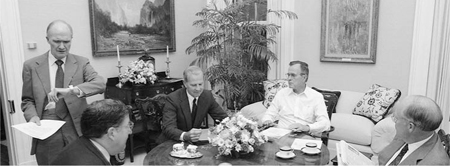The Last Empire (42 page)
Authors: Serhii Plokhy

Yeltsin would not yield: “We will create a union of states.”
Gorbachev went all out, threatening to leave the meeting. “If there is no state, then I will take no part in this process,” he told the gathering. “I can abandon it right now. This is my principled position. If there is not going to be a state, I consider my mission concluded. I cannot support something amorphous.”
Yeltsin and other members of the council tried to convince Gorbachev of the advantages of a confederative version of the treaty. In a confederation, they argued, the armed forces, transportation
system, ecological and space programs would be controlled from the center. Gorbachev would not listen. He stood up and began collecting his papers as an indication that he was about to leave. The republican leaders panicked and called for a break. Yeltsin met privately with Gorbachev, and they reached a compromise: the Union of Sovereign States, as the new structure was to be called, would constitute a “democratic confederative state.” It would not have a constitution, but its president would be elected by the people of the entire union.
Despite all the shortcomings of the new draft, Gorbachev was extremely satisfied: he had not managed to obtain a constitution, but he had secured a provision on the election of the president. The republican leaders agreed to initial the new union treaty at the next meeting of the State Council. Boris Pankin, who was present at Novo-Ogarevo, noted a “restless but happy look on Gorbachev's face.” As the members of the State Council headed for the exits, no one could say whether they would speak to the press or not, but Gorbachev's press secretary arranged the reporters in such a way as to block the exits. The Soviet president brought the republican leaders to the microphone one by one to make statements in support of the union state. “We have agreed that there will be a Unionâa democratic confederative state,” declared Yeltsin.
37
Gorbachev could feel triumphant. He seemed to have achieved something that no one, including his closest advisers, had thought possible. His interpreter, Pavel Palazhchenko, watched the press conference on television. In his memoirs, he wrote, “To almost everyone's surprise, Gorbachev did look like a winner in the late evening of November 14, as Yeltsin and others spoke into the microphones on live television, repeating the phrase, âThe Union will exist. There will be a Union.' Watching the live broadcast with my colleagues, I felt that they, like me, were surprised Gorbachev had pulled it off.”
38
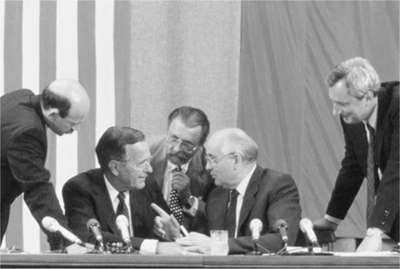
George Bush and Mikhail Gorbachev at a press conference after signing the START1 agreement on the reduction of nuclear arsenals. Gorbachev managed to persuade his military to agree to unprecedented cuts in the Soviet nuclear arsenal despite the lack of funds from the West. Kremlin, Moscow, July 31, 1991. (Corbis)
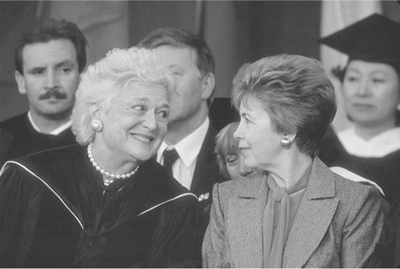
Barbara Bush and Raisa Gorbacheva had an agenda of their own in Moscow. The two first ladies got along exceptionally well. They are shown here in June 1990 at Wellesley College (Wellesley, Massachusetts), where they took part in a commencement ceremony in the course of the Gorbachevs' visit to the United States. (Corbis)
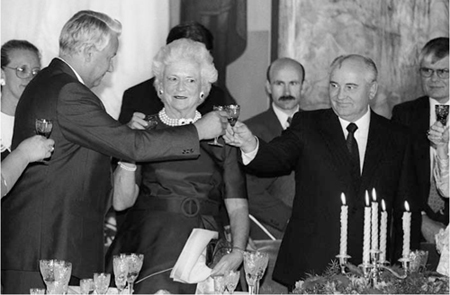
The party crasher. Boris Yeltsin tried to play host at a Kremlin reception in honor of George and Barbara Bush officially hosted by the Gorbachevs. Kremlin, Moscow, July 30, 1991. (ITAR-TASS Photo Agency)
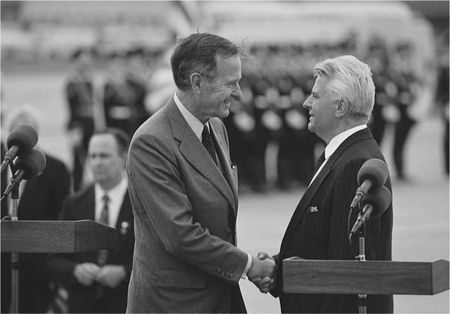
President Bush greeting Chairman Kravchuk. “Look people in the eye and you can figure out right away whether they will vote for you,” Bush told the future president of Ukraine, Leonid Kravchuk. Kravchuk took that advice to heart, winning the Ukrainian presidency and independence for his country in December 1991. Boryspil airport near Kyiv, August 1, 1991. (Corbis)
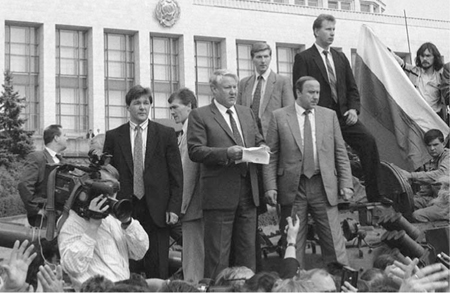
The rebel, Boris Yeltsin mounts a tank and declares the putsch unconstitutional. Bush was originally reluctant to support Yeltsin but, with Gorbachev detained by the plotters, had no choice but to throw his support behind the Russian president. Yeltsin's chief bodyguard, Aleksandr Korzhakov, is to his left. Moscow, August 19, 1991. (Corbis)
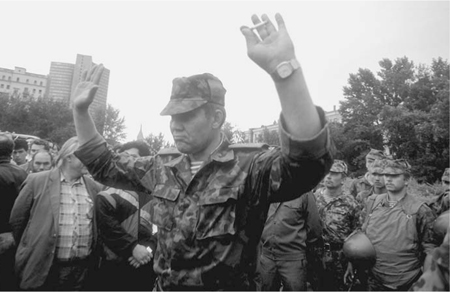
The army refuses to shoot at fellow citizens. General Aleksandr Lebed speaks to defenders of the Russian White House, Yeltsin's headquarters in downtown Moscow, on August 20, 1991. Privately he told Yeltsin that if he wanted the army on his side, he would have to declare himself commander in chief of the Russian armed forces. Yeltsin followed the general's advice and won. (Corbis)
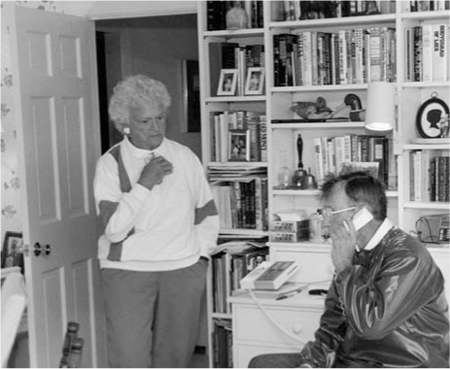
“Dear Mikhail,” wrote Bush on this photograph. “Here we are in Maine thinking about you in the Crimea. Thank God you and Raisa were safe and sound. Sincerely, George.” Bush is shown speaking with Gorbachev by telephone after his communication lines were restored on the afternoon of August 21, 1991. Walker's Point, Kennebunkport, Maine, August 21, 1991. (Corbis)
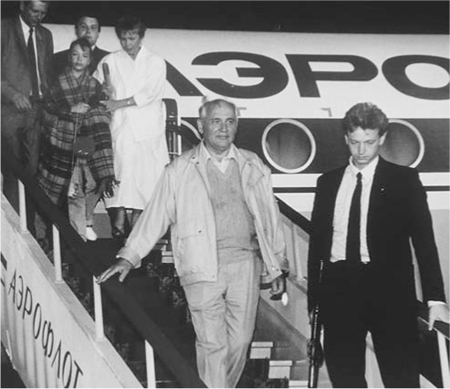
“We are returning to a different country,” said Gorbachev on the flight to Moscow after his imprisonment in the Crimea. He did not know how right he was. In the next few days Boris Yeltsin would strip him of most of his powers. Gorbachev is shown returning to Moscow on the night of August 22, 1991. Behind him are Raisa, who suffered a stroke during the imprisonment, and one of Gorbachev's granddaughters. (Corbis)
